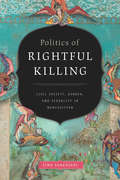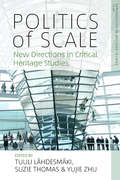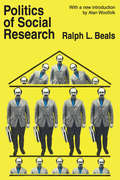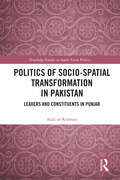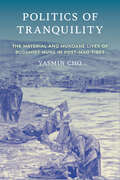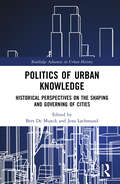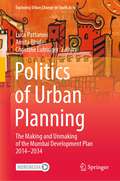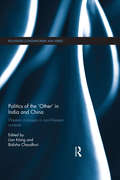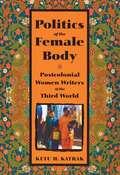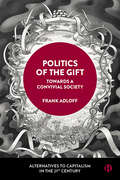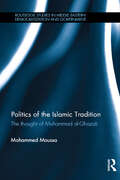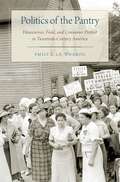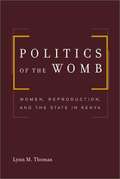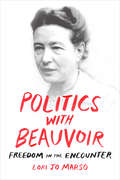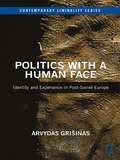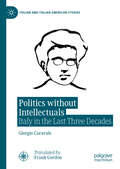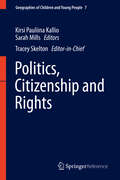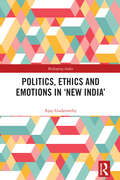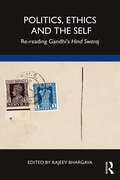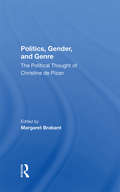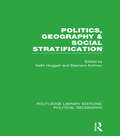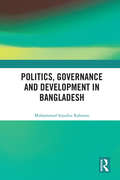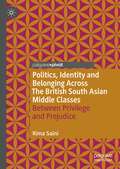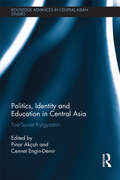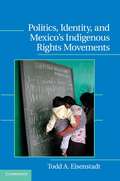- Table View
- List View
Politics of Rightful Killing: Civil Society, Gender, and Sexuality in Weblogistan
by Sima ShakhsariIn the early 2000s, mainstream international news outlets celebrated the growth of Weblogistan—the online and real-life transnational network of Iranian bloggers—and depicted it as a liberatory site that gave voice to Iranians. As Sima Shakhsari argues in Politics of Rightful Killing, the common assumptions of Weblogistan as a site of civil society consensus and resistance to state oppression belie its deep internal conflicts. While Weblogistan was an effective venue for some Iranians to &“practice democracy,&” it served as a valuable site for the United States to surveil bloggers and express anti-Iranian sentiment and policies. At the same time, bloggers used the network to self-police and enforce gender and sexuality norms based on Western liberal values in ways that unwittingly undermined Weblogistan's claims of democratic participation. In this way, Weblogistan became a site of cybergovernmentality, where biopolitical security regimes disciplined and regulated populations. Analyzing online and off-line ethnography, Shakhsari provides an account of digital citizenship that raises questions about the internet's relationship to political engagement, militarism, and democracy.
Politics of Scale: New Directions in Critical Heritage Studies (Explorations in Heritage Studies #1)
by Suzie Thomas Tuuli Lähdesmäki Yujie ZhuCritical Heritage Studies is a new and fast-growing interdisciplinary field of study seeking to explore power relations involved in the production and meaning-making of cultural heritage. Politics of Scale offers a global, multi- and interdisciplinary point of view to the scaled nature of heritage, and provides a theoretical discussion on scale as a social construct and a method in Critical Heritage Studies. The international contributors provide examples and debates from a range of diverse countries, discuss how heritage and scale interact in current processes of heritage meaning-making, and explore heritage-scale relationship as a domain of politics.
Politics of Social Research
by Ralph L. Beals Alan WoolfolkPolitics of Social Research addresses itself to the question of the behavior appropriate for social scientists conducting research sponsored by or otherwise involving government agencies-our own and those of other countries. The simple patriotism that suggests that social scientists, like other citizens, should not hesitate to put their skills at the service of their government is questioned here and by practitioners. This is partly because of outright disagreement with government policies and partly because of the threat to independence posed by massive government funding. As this book plainly shows, the problems are especially acute for social scientists working abroad, where they are viewed as de facto representatives of American policy while at the same time they must accommodate to the policies of foreign governments.
Politics of Socio-Spatial Transformation in Pakistan: Leaders and Constituents in Punjab (Routledge Studies in South Asian Politics)
by Asad Ur RehmanPolitics of Socio-Spatial Transformation in Pakistan analyses the relationship between socio-spatial transformation, styles of leadership and nature of constituents in Pakistan. It examines the way social change influences politics and leadership in its most populated province. Offering a unique viewpoint to study the relationship between politics and social change by examining the nature of relationship between leaders and their constituents, the author introduces the concept of Gradients of Engagements. The book describes the way values of engagement (Talluq) and styles of leadership mediate engagements among politicians, citizens and state bureaucracy in villages and small towns of Pakistani Punjab. Starting with the mapping of socio-economic and spatio-demographic non-metropolitan locales, the book illustrates the centrality of the processes of "rurbanization" and "governmentalization". It points out how political leaders mediate these processes, personal and public demands of their constituents’ invoking claims or representativeness and public service. The author breaks engagements between leaders and constituents into four gradients of representation (elections), public service delivery (development), everyday problem-solving (governance) and collective action, thus providing a contextualized and grounded comprehension of the process democratization and its substantive and performative aspects. In addition to providing a historical sketch of economic development, evolution of social organization and development of political institutions in Punjab, the book includes an ethnography of political elites and study of everyday political engagements to show how the styles of leadership mediates the process of institutional development and public service delivery in "rurban" Punjab. A novel contribution to the study of political processes such as state formation, collective action, representation, and citizenship in a comparative manner embedded in space and informed by cultural meanings, the book will be of interest to researchers studying South Asian, Pakistan and Punjab/Sikh studies, Development Studies and Urban Studies.
Politics of Tranquility: The Material and Mundane Lives of Buddhist Nuns in Post-Mao Tibet
by Yasmin ChoPolitics of Tranquility concerns the Tibetan Buddhist revival in China, illustrating the lives of Tibetan Buddhist nuns and exploring the political effects that arise from their nonpolitical daily engagements in the remote, mega-sized Tibetan Buddhist encampment of Yachen Gar. Yasmin Cho's book challenges two assumptions about Tibetan Buddhist communities in China. First, against the assumption that a Buddhist monastic community is best understood in terms of its esoteric qualities, Cho focuses on the material and mundane daily practices that are indispensable to the existence and persistence of such a community and shows how deeply gendered these practices are. Second, against the assumption that Tibetan politics toward the Chinese state is best understood as rebellious, incendiary, and centered upon Tibetan victimhood, the nuns demonstrate how it can be otherwise. Tibetan politics can be unassuming, calm, and self-contained and yet still have substantial political effects. As Politics of Tranquility shows, the nuns in Yachen Gar have called forth an alternative way of living and expressing themselves as Tibetans and as female monastics despite a repressive context.
Politics of Urban Knowledge: Historical Perspectives on the Shaping and Governing of Cities (Routledge Advances in Urban History)
by Jens Lachmund Bert De MunckThis book uses 'politics of urban knowledge' as a lens to understand how professionals, administrations, scholars, and social movements have surveyed, evaluated and theorized the city, identified problems, and shaped and legitimized practical interventions in planning and administration. Urbanization has been accompanied, and partly shaped by, the formation of the city as a distinct domain of knowledge. This volume uses 'politics of urban knowledge' as a lens to develop a new perspective on urban history and urban planning history. Through case studies of mainly 19th and 20th century examples, the book demonstrates that urban knowledge is not simply a neutral means to represent cities as pre-existing entities, but rather the outcome of historically contingent processes and practices of urban actors addressing urban issues and the power relations in which they are embedded. It shows how urban knowledge-making has reshaped the categories, rationales, and techniques through which urban spaces were produced, governed and contested, and how the knowledge concerned became performative of newly emerging urban orders. The volume will be of interest to scholars and students in the field of urban history and urban studies, as well as the history of technology, science and knowledge and of science studies.
Politics of Urban Planning: The Making and Unmaking of the Mumbai Development Plan 2014–2034 (Exploring Urban Change in South Asia)
by Luca Pattaroni Amita Bhide Christine LutringerThis book offers an interdisciplinary and dynamic account of the politicization of urban planning in Mumbai, India. It presents a unique perspective on the tensions and conflicts pervading the development and regulation of contemporary cities in the wider context of global urbanization, and broadens readers’ understanding of urban planning, chiefly focusing on the interplay between grassroots movements, experts’ involvement, and sociotechnical questions. As the respective chapters of the book show, the various controversies surrounding the Mumbai Development Plan (MDP) have called into question the social and political effects of reshaping the city, the exclusion, and inequalities it has produced, but also the role it confers on the state and the market, and its impacts on the environment. After carefully describing these controversies, the book tackles the fundamental democratic question of who gets to define the future of a city. Given its scope, the book is of interest to researchers, students, and teachers of city planning, urban development, and urban studies, as well as policymakers.
Politics of the 'Other' in India and China: Western Concepts in Non-Western Contexts (Routledge Contemporary Asia Series)
by Lion Koenig Bidisha ChaudhuriThe social sciences have been heavily influenced by modernization theory, focusing on issues of economic growth, political development and social change, in order to develop a predictive model of linear progress for developing countries following a Western prototype. Under this hegemonic paradigm of development the world tends to get divided into simplistic binary oppositions between the ‘West’ and the ‘rest’, ‘us’ and ‘them’ and ‘self’ and ‘other’. Proposing to shift the discussion on what constitutes the ‘Other’ as opposed to the ‘Self’ from philosophy and cultural studies to the social sciences, this book explores how the structural asymmetries existing between Western discourses and the realities of the non-Western world manifest themselves in the ideas, institutions and socio-political practices of India and China, and in how far they shape the social scientist’s understanding of their discipline in general. It provides a counter-narrative by revealing the relativity of geographies, and by showing that the conventional presentation of core elements of the Asian socio-political set-up as ‘aberrations’ from the Western models fails to acknowledge their inherent strategic character of adapting Western concepts to meet local requirements. Drawing on multiple disciplines, concepts and contexts in India and China, the book makes a valuable contribution to the theory and practice of politics, as well as to International and Asian Studies.
Politics of the Female Body: Postcolonial Women Writers
by Ketu H. KatrakIs it possible to simultaneously belong to and be exiled from a community? In Politics of the Female Body, Ketu H. Katrak argues that it is not only possible, but common, especially for women who have been subjects of colonial empires. <P><P>Through her careful analysis of postcolonial literary texts, Katrak uncovers the ways that the female body becomes a site of both oppression and resistance. She examines writers working in the English language, including Anita Desai from India, Ama Ata Aidoo from Ghana, and Merle Hodge from Trinidad, among others. The writers share colonial histories, a sense of solidarity, and resistance strategies in the on-going struggles of decolonization that center on the body. <P><P>Bringing together a rich selection of primary texts, Katrak examines published novels, poems, stories, and essays, as well as activist materials, oral histories, and pamphlets—forms that push against the boundaries of what is considered strictly literary. In these varied materials, she reveals common political and feminist alliances across geographic boundaries. <P><P>A unique comparative look at women’s literary work and its relationship to the body in third world societies, this text will be of interest to literary scholars and to those working in the fields of postcolonial studies and women’s studies.
Politics of the Gift: Towards a Convivial Society (Alternatives to Capitalism in the 21st Century)
by Frank AdloffAt the heart of capitalism lies the idea of ‘homo economicus’: an ever-rational human being motivated by self-interest which arguably leads societies to economic prosperity. Drawing on French sociologist Marcel Mauss' influential theory of ‘the gift’, Frank Adloff shatters this fallacy to show mutual trust is the only glue that holds societies together; people are giving beings and they can cooperate for the benefit of all when the logic of maximizing personal gain in capitalism is broken. Acknowledging the role of women, nature, and workers in the Global South in transforming society, this book proposes a politics of conviviality, (from the Latin con-vivere: living together) for global and environmental justice as an alternative to the pursuit of profit, growth, and consumption.
Politics of the Islamic Tradition: The Thought of Muhammad Al-Ghazali (Routledge Studies in Middle Eastern Democratization and Government)
by Mohammed MoussaOver the last two centuries the Muslim world has undergone dramatic transformations, impacting the Islamic tradition and throwing into question our understanding of tradition. The notion of tradition as an unmoving edifice is contradicted by the very process of its transmission, and the complex role human beings play in creating and sustaining traditions is evident in the indigenous mechanisms of change within the Islamic tradition. Politics of the Islamic Tradition locates the work of Egyptian cleric Muhammad al-Ghazali within the context of this dynamic Islamic tradition, with special focus on his political thought. Al-Ghazali inherited a vast and diverse heritage which he managed to reinterpret in a changing world. An innovative exploration of the change and continuity present within Muslim discourses, this book brings together disparate threads of the Islamic tradition, religious exegesis, the contemporary Arab Middle East, the Islamic state and idea of renewal in al-Ghazali’s thought. As well as being one of the first complete treatments of al-Ghazali’s works, this book provides an original critical approach to tradition and its capability for innovation and change, countering the dichotomy between tradition and modernity that typically informs most scholarly studies on contemporary Islam. Offering highly original insights into Islamic thought and engaging with critical notions of tradition, this book is essential reading for students and scholars of Islamic Politics and History.
Politics of the Pantry: Housewives, Food, and Consumer Protest in Twentieth-century America
by Emily E. LB. TwarogThe history of women's political involvement has focused heavily on electoral politics, but throughout the twentieth century women engaged in grassroots activism when they found it increasingly challenging to feed their families and balance their household ledgers. Politics of the Pantryexamines how working- and middle-class American housewives used their identity as housewives to protest the high cost of food. In doing so, housewives' relationships with the state evolved over the course of the century. Shifting the focus away from the workplace as a site of protest, Emily E. LB. Twarog looks to the homefront as a starting point for protest in the public sphere. With a focus on food consumption rather than production, Twarog looks closely at the ways food - specifically meat - was used by women as a political tool. Engaging in domestic politics, housewives both challenged and embraced the social and economic order as they sought to craft a unique politicalvoice and build a consumer movement focused on the home. The book examines key moments when women used consumer actions to embrace their socially ascribed roles as housewives to demand economic stability for their families and communities. These include the Depression-era meat boycott of 1935, the consumer coalitions of the New Deal, and the wave ofconsumer protests between 1966 and 1973. Twarog introduces numerous labor and consumer activists and their organizations in both urban and suburban areas - Detroit, greater Chicago, Long Island, and Los Angeles.
Politics of the Womb: Women, Reproduction, and the State in Kenya
by Lynn M. ThomasIn more than a metaphorical sense, the womb has proven to be an important site of political struggle in and about Africa. By examining the political significance--and complex ramifications--of reproductive controversies in twentieth-century Kenya, this book explores why and how control of female initiation, abortion, childbirth, and premarital pregnancy have been crucial to the exercise of colonial and postcolonial power. This innovative book enriches the study of gender, reproduction, sexuality, and African history by revealing how reproductive controversies challenged long-standing social hierarchies and contributed to the construction of new ones that continue to influence the fraught politics of abortion, birth control, female genital cutting, and HIV/AIDS in Africa.
Politics with Beauvoir: Freedom in the Encounter
by Lori Jo MarsoIn Politics with Beauvoir Lori Jo Marso treats Simone de Beauvoir's feminist theory and practice as part of her political theory, arguing that freedom is Beauvoir's central concern and that this is best apprehended through Marso's notion of the encounter. Starting with Beauvoir's political encounters with several of her key contemporaries including Hannah Arendt, Robert Brasillach, Richard Wright, Frantz Fanon, and Violette Leduc, Marso also moves beyond historical context to stage encounters between Beauvoir and others such as Chantal Akerman, Lars von Trier, Rahel Varnhagen, Alison Bechdel, the Marquis de Sade, and Margarethe von Trotta. From intimate to historical, always affective though often fraught and divisive, Beauvoir's encounters, Marso shows, exemplify freedom as a shared, relational, collective practice. Politics with Beauvoir gives us a new Beauvoir and a new way of thinking about politics—as embodied and coalitional.
Politics with a Human Face: Identity and Experience in Post-Soviet Europe (Contemporary Liminality)
by Arvydas GrišinasPolitics with a Human Face presents a holistic understanding of identity formation in post-Soviet Europe, arguing that since politics is fundamentally a human affair. In order to adequately understand it, one needs to understand its human side first. Drawing on the thought of Dilthey, Ricoeur and Plato, the author employs empathy as a method, together with visual and historical analysis, to analyse the role of human experience in post-Soviet politics. As a result, the book offers a theoretical approach for assessing influence of the non-rationalistic factors, such as associative symbolism, human experience, political images and historical narratives, in both domestic and foreign affairs. A study at the juncture of Social Sciences and Humanities, Politics with a Human Face explores a number of cases, including Estonia, Lithuania, Poland and Russia, as well as the ongoing conflict in Ukraine, examining issues of liminal transition, ‘far-right’ movements, victimhood, ethnic conflict and political paradoxes. Seeking to shed light on the region’s agency and perception of both its own political and existential situation, and that of the surrounding world, this book constitutes a timely and original contribution to understanding the post-Soviet Europe.
Politics without Intellectuals: Italy in the Last Three Decades (Italian and Italian American Studies)
by Giorgio CaravaleThe book is the first historical reconstruction of Italian political events over the last thirty years, that is, the period from the Tangentopoli crisis of the early 1990s to the present day. In particular, the book examines, for the first time in a systematic and documented way, the controversial relationship between parties and intellectuals, highlighting the distance, not to say the unbridgeable gap, created between politics and culture in Italy in the last three decades, the decades of the so-called Second Republic. In other words, it tries to explain why the close link between politics and culture that was the hallmark of twentieth-century politics has dissolved in Italy, and through what stages we have come to a substantial incommunicability between these two worlds in the last three decades.
Politics, Citizenship and Rights
by Tracey Skelton Kirsi Pauliina Kallio Sarah MillsThis volume explores the political geographies of children and young people and aims to cement this research area within human geography and beyond. Indeed, the policies that specifically target young individuals and groups, and the politics in the everyday lives of children and youth across all scalar dimensions deserve broad attention. The book is structured in four sections with specific focus on the spatialities of the rights of the child, children and young people's agency in politics, youthful practice as political resistance, and active youth citizenship. In the 28 chapters, a total of 43 authors based in 14 different countries explicate how issues of youthful citizenship, children's rights, and children and young people's political agencies cross disciplinary, methodological and theoretical boundaries, with notable geographical variation. Particular attention falls on children and young people's active roles in different kinds of political situations, environments, processes, and practices. The volume also emphasises that there is scope for future research, not least because of the shifting (geo)political landscapes across the globe.
Politics, Ethics and Emotions in ‘New India’ (Reshaping India)
by Ajay GudavarthyHow do emotions mobilize in politics? How do they frame ideologies? Broadly focusing on these questions, this book explains the role emotions play in Indian politics, and the part they played in the aftermath of the 2019 general elections. It traces the consolidation of the Right in India and highlights the reasons for its electoral successes with a focus on the interplay between ethics and emotions such as fear, anxiety, guilt, shame, anger, hatred, betrayal and violence. At the same time, it traces the changing dynamic in the way we think about politics and analyses the failure of liberal democratic institutions to make space for emotions in politics and political motivations. An accessible and essential guide to understanding contemporary India, this book will be of great interest to scholars and researchers of politics, especially governance and political theory, as well as South Asian studies.
Politics, Ethics and the Self: Re-reading Gandhi’s Hind Swaraj
by Rajeev BhargavaHind Swaraj by Mahatma Gandhi is arguably the greatest text to have emerged from the anti-colonial movement in India and the first to seriously challenge the cultural and civilizational premises of the colonizers’ mentality. It is also the first text in India that falls within the broad tradition of modern political philosophy, advancing a complex cluster of theses with conceptual sensitivity, analytical precision, and sustained argument. This book critically engages with Hind Swaraj and explores the fascinating and subtle dialogue set up by Gandhi between the characters of the reader and the editor. With essays from leading contemporary thinkers on Gandhi, the volume looks at themes such as Gandhi on epistemic servitude, decolonization, and intercultural translation; his complex critique of modern civilization; his views on the empire, democracy, citizenship, and violence; the normative structure of Gandhian thought; Gandhi and the political praxis of educational reconstruction; and how to read this text. An important intervention in Gandhian studies, this book will be useful for scholars and researchers of peace studies, political philosophy, Indian philosophy, Indian political thought, political sociology, and South Asian studies.
Politics, Gender, And Genre: The Political Thought Of Christine De Pizan
by Margaret BrabantChristine de Pizan (ca. 1364-1429) wrote more than twenty books, including poetry, defenses of women, critiques of war, Utopian visions, and general political and social commentary. This body of writing not only supported her during her lifetime but also brought her fame, patronage, and influence in high places. The revival of interest in her work is one of the major successes in the movement to recognize "lost" or overlooked women in the history of intellectual thought. Her courageous defense of women makes her, in the eyes of most, a protofeminist figure, and the depth of her feminism is one of the key issues debated in these essays by the world's leading Christine scholars. Other important topics are Christine's contribution to early humanist thought and the various ways in which her unique position sheds light on medieval politics and society. This book is a valuable contribution to medieval studies and political theory as well as to the history of feminist thought. It will be essential reading for philosophers and political scientists and for medievalists in any discipline.
Politics, Geography and Social Stratification (Routledge Library Editions: Political Geography)
by Eleonore Kofman Keith HoggartThe major themes explored in this book, originally published in 1986, are the political resonances of social stratification and change; the growing distance between the working class and the providers of social services; and the role of locality in social reproduction. The relationship between society and space is the subject of a major debate in developed countries. The key questions are about just how far spatial patterns and local conditions affect social relations and stratification and how far they shape collective action, electoral responses and class.
Politics, Governance and Development in Bangladesh
by Muhammad Sayadur RahmanThis book explores the relationship between bureaucrats and elected politicians in Bangladesh and discusses how this impacts governance and development in the country from an empirical perspective. It looks at the interplay of politics and bureaucracy in ancient societies, western democracies and in the developing world while highlighting the uniqueness of the Bangladesh experience and its indigenous contexts of local governance. The author presents a historical overview of the nature of political development, shift of regimes in Bangladesh, and the role of various agents and stakeholders. Through a detailed study, the book provides an analytical and theoretical framework to understanding the linkages between politics and bureaucracy, governance and development in South Asia and Bangladesh, with implications for geopolitics and economic growth. This book will be of interest to scholars, researchers and students of political economy, development studies, public administration, comparative politics as well as to policymakers, bureaucrats, government bodies, and especially those concerned with Bangladesh.
Politics, Identity and Belonging Across The British South Asian Middle Classes: Between Privilege and Prejudice (Palgrave Politics of Identity and Citizenship Series)
by Rima SainiThis book will discuss the growing socio-economic and political diversity of the groups that comprise the British South Asian diaspora, with a focus on the formation of the British South Asian "middle classes". They will be framed within this work as a heterogenous sub-population, but this book is be the first comprehensive effort to define them sociologically as a distinct ethnoracial collective with a unique political profile. It does this with reference to secondary statistical data and primary interview data, and engages with relevant academic and non-academic literature. It describes the ways in which socially mobile South Asian migrants and particularly their descendants in the UK relate to their racial, ethnic, religious, classed and gendered identities, their relationship with ‘Britishness’, and their politics. It will therefore be of interest to students and researchers of political sociology, particularly those specialising in race, processes of racism and racialisation, ethnic and ethno-religious identity, class and social mobility amongst ethnic minority groups, and the interaction between minority identity and political identity.
Politics, Identity and Education in Central Asia: Post-Soviet Kyrgyzstan
by Pınar Akçalı Cennet Engin-DemirFocusing on the areas of politics, identity and education, this book looks at some of the most pressing and challenging issues that Kyrgyzstan faces in the post-Soviet era. It argues that Kyrgyzstan is challenged with oscillations between the old and the new on the one hand, and domestic and international on the other. The book analyses the process of post-Soviet transition in today’s Kyrgyzstan by focusing on the political elites, some of the major identity problems and educational issues. It discusses how Kyrgyzstan’s first president in the post-Soviet era had already been an exceptional leader even prior to the collapse of the Soviet Union in terms of his democratic and liberal tendencies. The book goes on to look at how identity is a major factor in the country, shaped to a large extent by genealogical factors and patron-client mechanisms on the one hand, and religious considerations on the other. Finally, it highlights how education has been perceived as a very influential agent of socialization that develops not only literacy and other skills, but also common attitudes and values that are considered essential to any society. By evaluating these three areas, the book argues that Kyrgyzstan cannot isolate itself from the demands, priorities and pressures of international actors, which sometimes are in conflict with the country’s domestic conditions. It is of interest to students and scholars of Asian Studies, Politics and International Relations.
Politics, Identity, and Mexico’s Indigenous Rights Movements
by Todd A. EisenstadtDrawing on an original survey of more than 5,000 respondents, this book argues that, contrary to claims by the 1994 Zapatista insurgency, indigenous and non-indigenous respondents in southern Mexico have been united by socioeconomic conditions and land tenure institutions as well as by ethnic identity. It concludes that - contrary to many analyses of Chiapas's 1994 indigenous rebellion - external influences can trump ideology in framing social movements. Rural Chiapas's prevalent communitarian attitudes resulted partly from external land tenure institutions, rather than from indigenous identities alone. The book further points to recent indigenous rights movements in neighboring Oaxaca, Mexico, as examples of bottom-up multicultural institutions that might be emulated in Mexico and elsewhere in Latin America.
